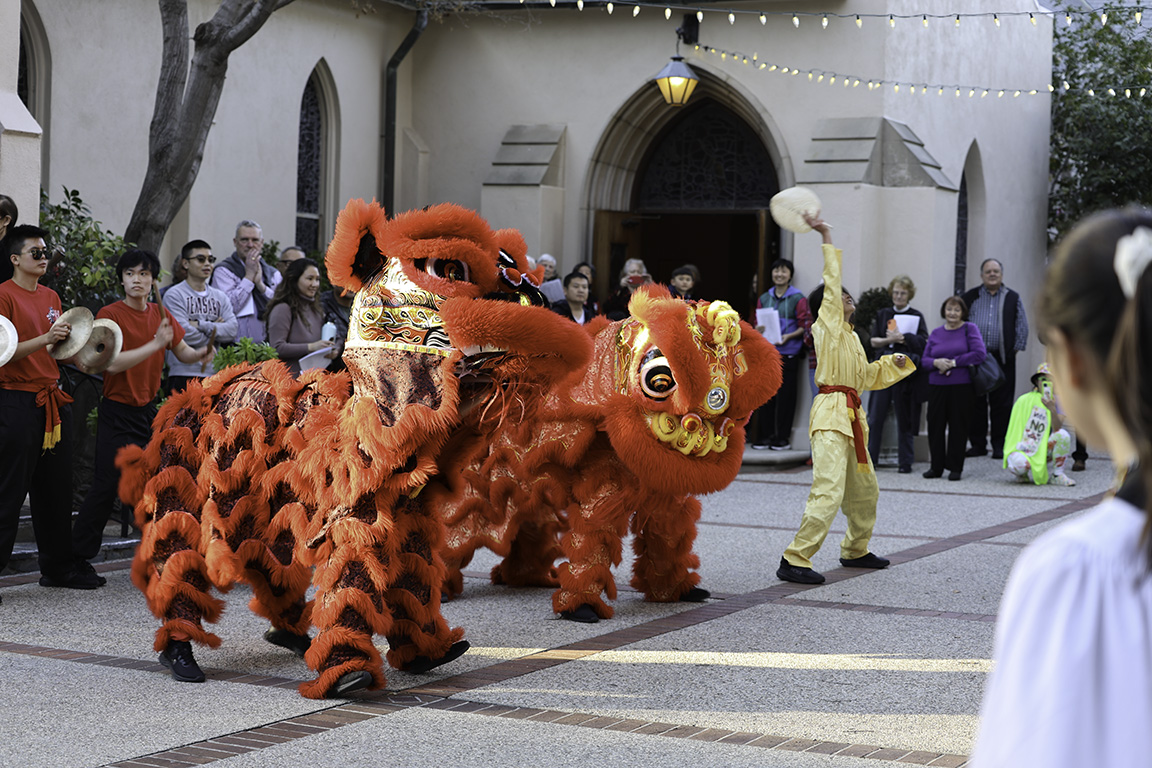
At Church of Our Saviour, San Gabriel, traditional Chinese lion dancers and drummers get Lunar New Year service honoring Li Tim-Oi off to a heart-pounding start. Photos: Janet Kawamoto
[The Episcopal News] With the rat-a-tat-tat crackle of drums, dragon dancers pranced in procession at a joyous Feb. 11 Eucharist celebrating the 80th anniversary of the ordination of the Rev. Florence Li Tim-Oi, the first woman ordained a priest in the Anglican Communion, and the Lunar New Year of the Dragon.
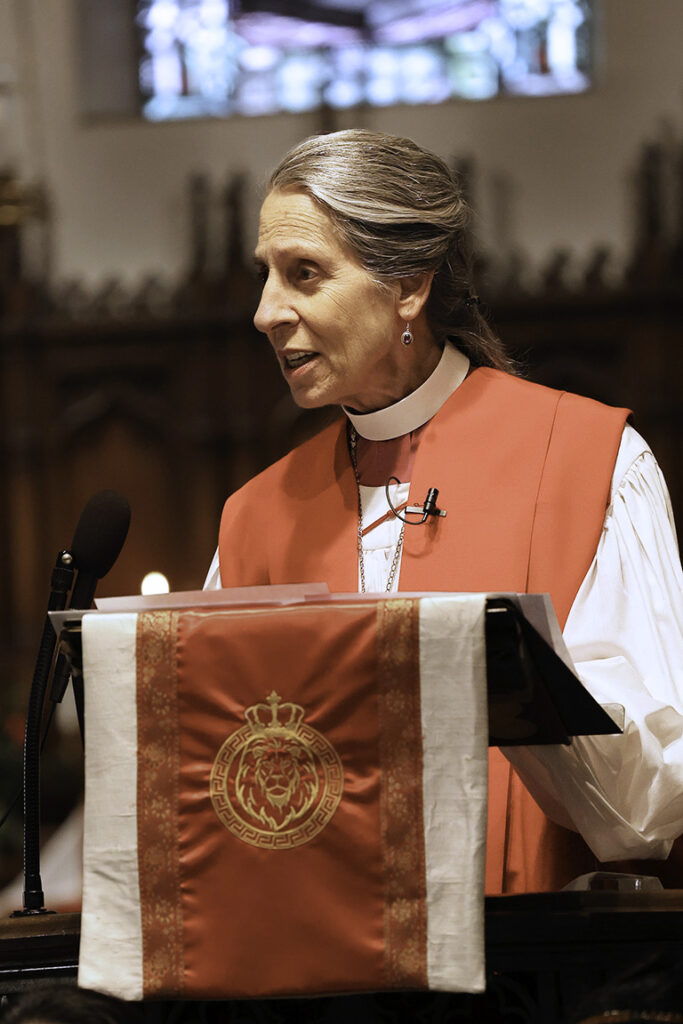
In her sermon at the Feb. 11 service former Presiding Bishop Katharine Jefferts Schori lauds Li Tim-Oi’s life of faith, perseverance, selfless love and service.
“Li Tim-Oi called her vocation ‘making friends for Jesus,’” according to former Presiding Bishop Katharine Jefferts Schori, guest preacher at the Eucharist, which was offered in Cantonese, Mandarin, Taiwanese, and English at the Church of Our Saviour in San Gabriel.
A video of the service is here. A gallery of photos from the weekend festivities is here.
“Tim-Oi’s life was filled with courageous decisions in an era of cultural transition and war, ”and her ministry emulated the selfless love Tim-Oi admired in Florence Nightingale, whose name she took at her baptism, Jefferts Schori said.
Tim-Oi was ordained to the priesthood in Hong Kong by Bishop Ronald Hall in 1944 as an emergency measure following the Japanese invasion of China. The bishop wanted to ensure that Christians in Macau, where Tim-Oi was already serving a deacon, would not be left without a priest.
As a deaconess, she scavenged food for the community, ministered to the dead and dying. “A local girl’s school invited her to speak with the students, and 70 of them asked to be baptized,” Jefferts Schori said. “Hundreds more were baptized during the war.”
Hall, recognizing that Tim-Oi was performing priestly work, ordained her in Chongqing amid an ecumenical congregation. “In a small, out of the way place, a new reality was born, “ said Jefferts Schori; “a woman, bringing love and offering saving grace for all sorts and conditions of humanity.”
After the war, Tim-Oi’s ordination spurred controversy, and in 1946 Hall asked her to resign from priestly ministry.
“Two Lambeth Conferences and 20 years later, the bishops encouraged the ordination of women deacons and stopped calling them deaconesses,” Jefferts Schori said. “The following Lambeth Conference in 1978, the bishops recognized the autonomy of each of its member churches and the legal right of each church to make its own decision about women priests.”
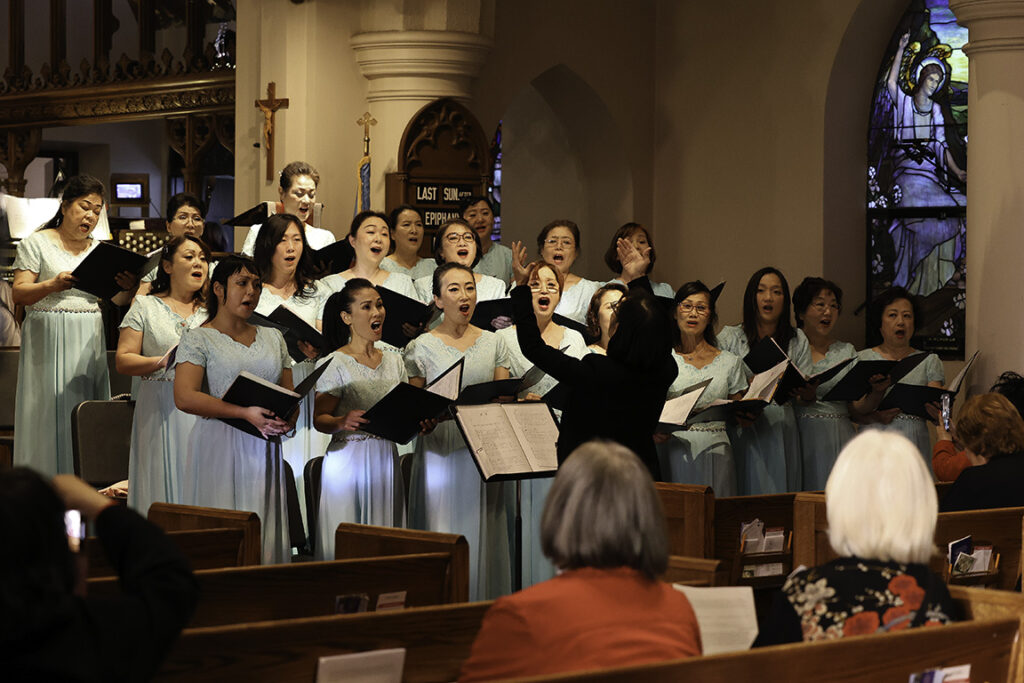
The Nightingale Ensemble of L.A., a choir of Chinese women conducted by Hua Yu, performs during the service.
Three provinces in the Anglican Communion still do not ordain women at all—Melanesia, Papua, New Guinea, and Southeast Asia, she said. More than half the provinces haven’t yet ordained any women bishops and about one- fourth of the Communion prohibits ordaining women bishops. “We still have a long way to go,” Jefferts Schori said.
Tim-Oi was later relegated to menial work during the Cultural Revolution. “She was humiliated, robbed, starved, and made to wear a sign that said ‘backward priest opposed to the revolution,’” Jefferts Schori said. “Eventually, the Cultural Revolution fizzled, and in 1979 churches were permitted to reopen.” Two years later, Tim-Oi emigrated to Canada, and resumed her vocation.
“The ordination of women and all sorts and conditions of humanity, and the honoring of local culture are essential to the fullness of God’s creation. Each and every human being and creature is honored and valued in God’s good creation,” said Jefferts Schori, charging the congregation to, like Tim-Oi, go and make friends for Jesus.
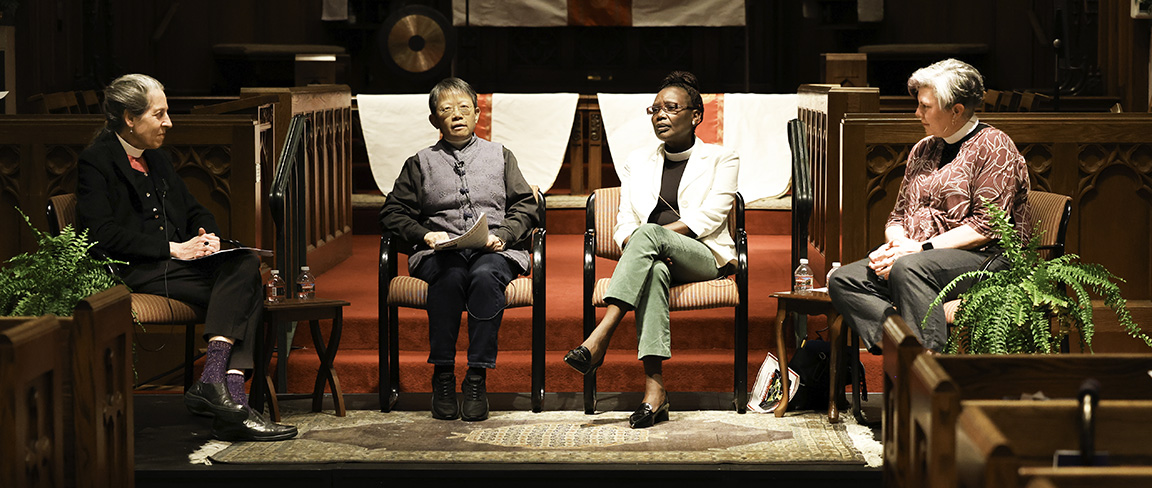
Panelists Katharine Jefferts Schori, Fennie Chang, Mary Tororeiy and Melissa McCarthy share their experience of women’s ministry.
Panelists share varied experiences of women in ministry
A day earlier, Jefferts Schori joined a panel of women clergy at the San Gabriel church, moderated by the Rev. Canon Susan Russell, diocesan missioner for Engagement Across Difference.
“The Holy Spirit demonstrated the need for Florence’s priestly ministry amid the chaos of war,” Bishop John Harvey Taylor said when introducing the panelists. “In bad times, society needs everyone; it’s obvious. In quieter times we should be ashamed of how long it takes for us to figure out that everyone is entitled to full standing and equal rights. In crisis we are one, but we are also one in Christ – and yet Christ’s own church still struggles to understand.”
“It’s been a long journey” for women’s ordination in the church, said Russell, adding that in addition to commemorating Tim-Oi’s ordination, this is also the year marking 50 years of the ordination of women in the Episcopal Church who broke that stained glass ceiling in Philadelphia. “We’ve learned a lot along the way. What we have here is a paradigmatic example of what can happen when the Holy Spirit moves, when people of deep faith, listen, when they unify, when they organize and when they mobilize in order to make a difference. That’s how we’ve gotten to where we are now.”
The Rev. Mary Tororeiy, a panelist, told the gathering she received scholarship aid from the Li Tim-Oi Foundation in the United Kingdom “that gives money for seminary education for women in the rest of the world,” in response to a question about how her experience of women as priests informed, inspired, and influenced her own call to ministry.
Tororeiy, vicar of St. Paul’s Episcopal and Shepherd of the Desert Lutheran churches in Barstow, said the Mother’s Union in Kenya had also influenced her ministry. Tororeiy, who was among the first women ordained in the Diocese of Eldoret in 2002, sees progress in women’s ministry. “We were three; now there are 54 women ordained in that diocese.” She also noted that the Anglican Church in Africa collectively has six women bishops. “I’m excited about how many women bishops we have. God is amazing.”
The Mother’s Union is a worldwide Christian organization with more than 6 million members dedicated to service, prayer, and worship. “These women are leaders in the church,” said Tororeiy. “They lead services, they preach, they do community work, they go to prisons to pray for people in jail. They organize and do the Lord’s work and I saw these women … keeping the church going, and that inspired me that I can go out and do the same.”
Panelist Melissa McCarthy, canon to the ordinary for the diocese, said she also sees progress in the church, noting a conversation she had with a trans man who is in seminary and will seek ordination. “That other thing that gives me hope is that this is God’s church. We do a lot to mess it up, but we’re not killing it. God is taking care of things. I have a lot of faith and hope in God’s presence within us and among us.”
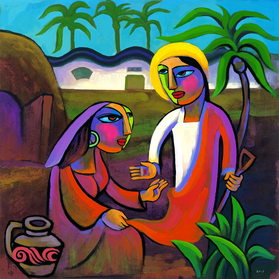
“Do Not Hold On To Me” is one of the artworks by James He Qi featured in a show during the Lunar New Year festivities at Church of Our Saviour, San Gabriel.
The Rev. Hsin-Fen (Fennie) Chang, vicar of St. Thomas Church in Hacienda Heights, said she struggled with doubts about her future as an ordained single woman. Originally from Taiwan, she had many concerns about finding a place to serve in the church prior to joining St. Thomas, Hacienda Heights as a parishioner while the late Rev. Canon Deborah Dunn was vicar.
But she began serving as an interpreter and “God opened the door through people who encouraged me, who supported me, and who helped me,” she said. “Now I am the convener of the Episcopal Asiamerica Ministry for the diocese. I never thought I would have that role. But there has been some kind of power pushing me toward where I need to be … so if any of you have thought about being ordained, if that seed of hope is in you,” pay attention to it, she said.
A video of the panel discussion is here.
The weekend festivities also included a Feb. 10 art show fundraiser featuring the works of acclaimed artist He Qi and two traditional Lunar New Year dinners.
